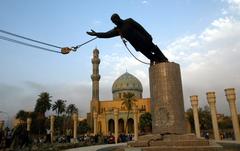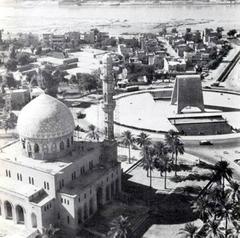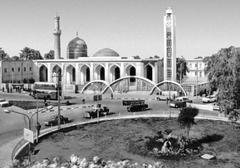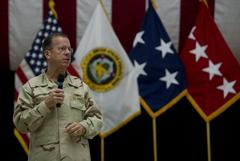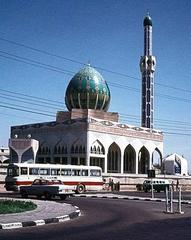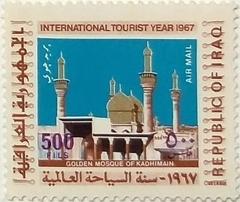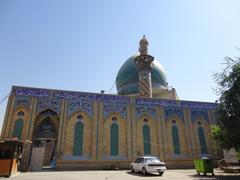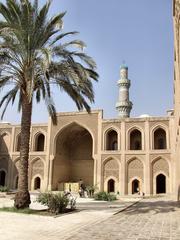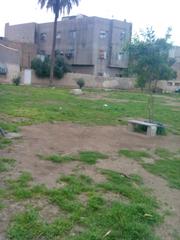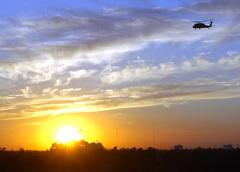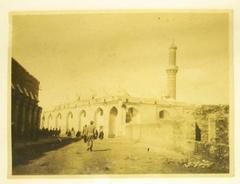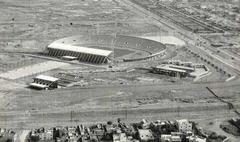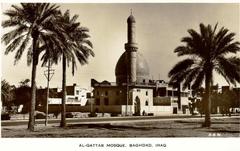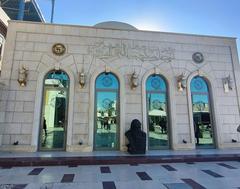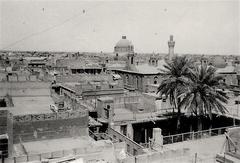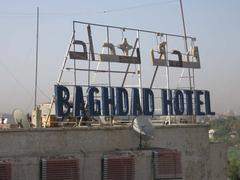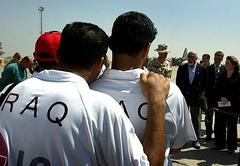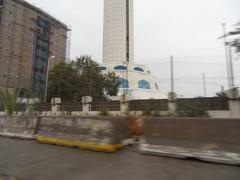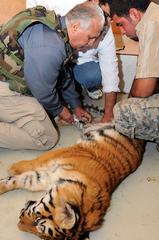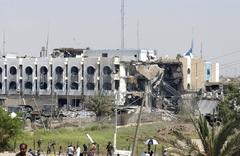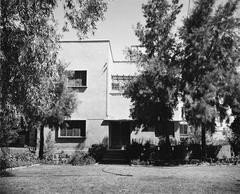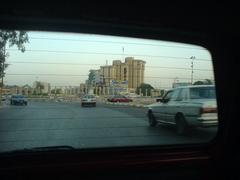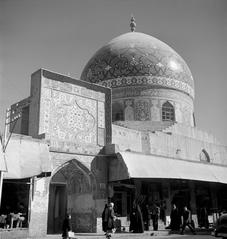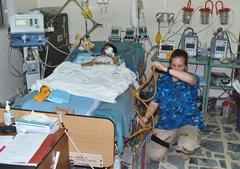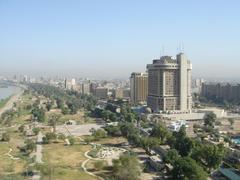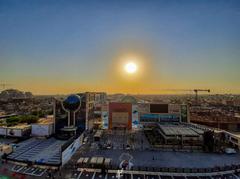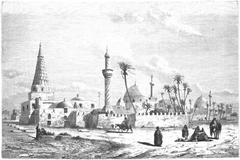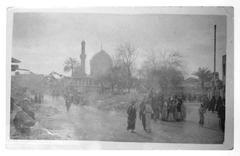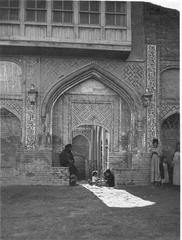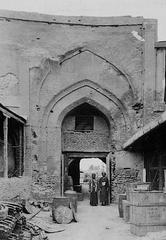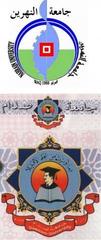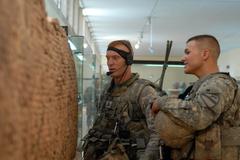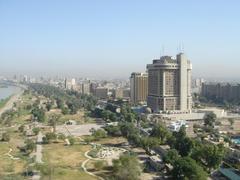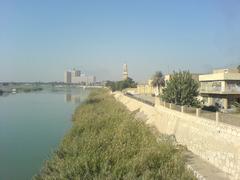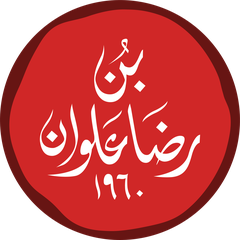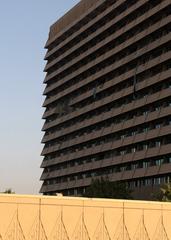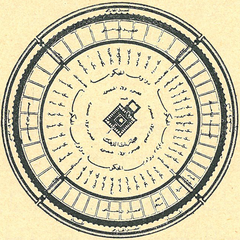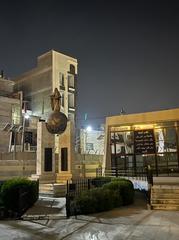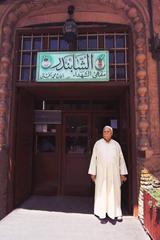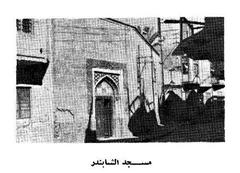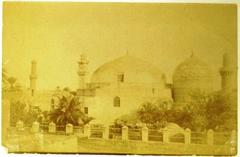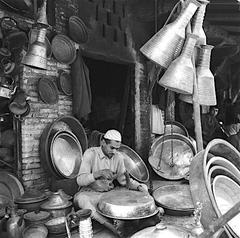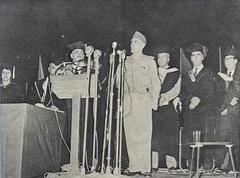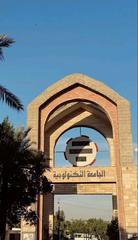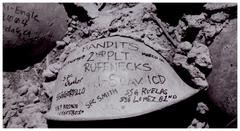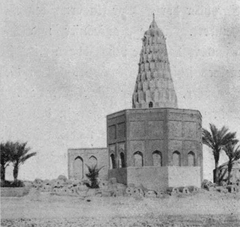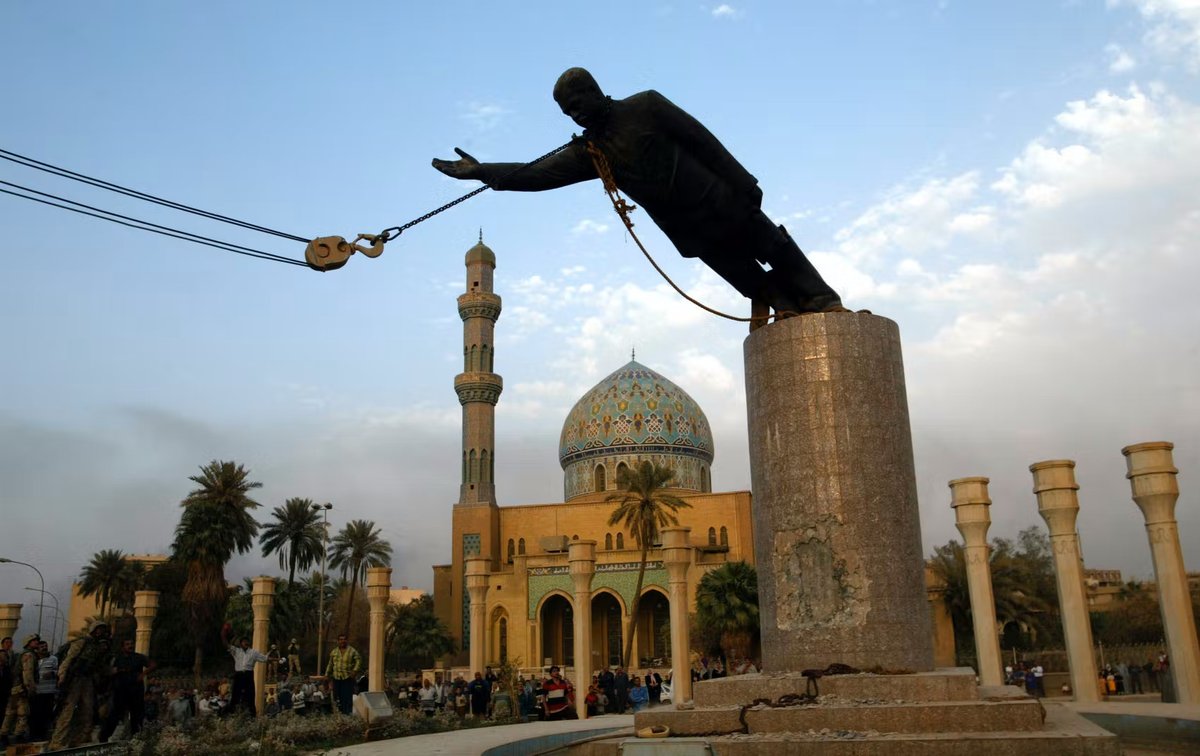
Mosque of 17 Ramadan Baghdad: Visiting Hours, Tickets, and Travel Guide
Date: 14/06/2025
Introduction
The Mosque of 17 Ramadan (Jami’ Sabata’ash Ramadan / جامع ١٧ من رمضان) stands as an enduring symbol of Baghdad’s religious, political, and cultural legacy. Located in the historic al-Rusafa district, opposite the renowned al-Firdos Square, the mosque is not only a place of worship for up to 2,500 people but also a living monument reflecting Iraq’s layered history and evolving identity. With roots that trace back to the 1930s during the reign of King Ghazi and a completion in 1959, the mosque has witnessed—and commemorated—pivotal moments in the nation’s journey. Its architecture, calligraphy, and community functions make it a key destination for pilgrims, historians, and cultural travelers alike (Wikipedia; Everything Explained Today).
This comprehensive guide provides insight into the mosque’s historical context, religious and cultural significance, architectural highlights, visiting hours, accessibility, etiquette, and practical travel information. Whether your interest lies in spirituality, history, or urban exploration, the Mosque of 17 Ramadan offers a rich and welcoming experience at the heart of Baghdad.
Table of Contents
- Historical Background and Political Context
- Religious and Cultural Significance
- Visitor Information
- Cultural Etiquette and Practical Tips
- Frequently Asked Questions (FAQ)
- Summary and Recommendations
- References
Historical Background and Political Context
Foundation and Early Construction
The Mosque of 17 Ramadan was conceived during the reign of King Ghazi (1933–1939). Its foundation stone was laid in the 1930s, but construction was delayed and only completed in 1959 amid significant political changes. The mosque spans 5,000 square meters, including a spacious prayer hall, women’s chapel, administrative rooms, and landscaped gardens. These features reflect both traditional Islamic architecture and the evolving urban landscape of Baghdad (Wikipedia; Everything Explained Today).
Political Transformations and Renaming
The mosque’s history is intricately tied to Iraq’s political shifts. Originally referred to as the “Mosque of the Martyr” after the 1958 revolution, it was later renamed “14th of Ramadan Mosque” to commemorate the Ba’ath Revolution. After the fall of Saddam Hussein’s regime in 2003, and the toppling of his statue in the nearby al-Firdos Square, the mosque adopted its current name, commemorating the historic Battle of Badr fought on the 17th day of Ramadan (Wikipedia).
The Mosque and Al-Firdos Square
Positioned opposite al-Firdos Square, the mosque shares symbolic significance with this prominent urban space, which has hosted key national monuments and witnessed major political events, including the dramatic toppling of Saddam’s statue in 2003.
The 17th of Ramadan: Religious and Historical Significance
The mosque’s name honors the 17th day of Ramadan, marking the Battle of Badr in 624 CE—a defining moment in early Islamic history that is celebrated as a symbol of faith and unity among Muslims (Wikipedia).
Architectural and Artistic Heritage
The mosque is renowned for its elegant Islamic design, punctuated by the masterful calligraphy of Hashem Muhammad al-Baghdadi. The calligraphic panels, especially on the qibla wall and within the gardens, are considered artistic treasures. The presence of the Ahl al-Qur’an Center underscores the mosque’s role in Quranic education and cultural preservation (Wikipedia).
Religious and Cultural Significance
Spiritual Importance and Role During Ramadan
The Mosque of 17 Ramadan is a vibrant center of spiritual life in Baghdad. Alongside regular daily prayers and the Friday Jumu’ah, it plays a prominent role during Ramadan, hosting taraweeh prayers, Quran recitations, and communal iftars that strengthen community bonds (TripXL; Hawzah News Agency).
Community Activities and Charitable Work
Beyond worship, the mosque serves as a hub for charitable work—organizing food and clothing drives, supporting educational programs, and providing guidance on both spiritual and social matters. These activities are heightened during Ramadan and other religious occasions, reflecting the Islamic emphasis on compassion and social solidarity (Explore Islam).
Visitor Information
Visiting Hours and Entry
- Opening Times: Generally open every day from 7:00 AM to 7:00 or 8:00 PM. Hours may vary during Ramadan or special religious events.
- Entry: Free for all visitors. Modest dress and respectful conduct are required.
Accessibility and Facilities
- Accessibility: Ramps and accessible prayer areas are provided for worshippers with disabilities. Contact the mosque in advance for specific assistance.
- Facilities: Clean ablution areas, separate entrances for men and women, and basic restrooms are available. Carry your own tissues and hand sanitizer for comfort.
Guided Tours and Nearby Attractions
- Guided Tours: Available through local agencies or by arrangement with mosque staff, especially during Ramadan.
- Nearby Attractions:
- Al-Firdos Square: Site of historic events, directly opposite the mosque.
- National Museum of Iraq: A short drive away, home to world-class archaeological collections.
- Ishtar Hotel and Al-Mutanabbi Street: For dining, accommodation, and cultural immersion.
Cultural Etiquette and Practical Tips
Dress Code and Conduct
- For Men: Long trousers and sleeved shirts are expected.
- For Women: Arms, legs, and hair should be covered; headscarves are recommended.
- General: Remove shoes before entering prayer areas and maintain a quiet, respectful demeanor. Photography inside may require permission, especially during prayers (muslimculturehub.com).
Prayer Times and Participation
- Non-Muslim Visitors: Welcome, but should avoid the main prayer rows and observe respectfully from designated areas, particularly during busy times (muslimculturehub.com).
- Fridays and Ramadan: Expect increased crowds and restricted access during Jumu’ah and Ramadan evenings.
Language and Safety Considerations
- Language: Arabic is primary, but basic greetings like “As-salamu alaykum” are appreciated.
- Safety: Remain vigilant in crowds, keep valuables secure, and follow local travel advisories (travellikeaboss.org).
Frequently Asked Questions (FAQ)
Q: What are the visiting hours for the Mosque of 17 Ramadan?
A: Typically from 7:00 AM to 7:00 or 8:00 PM daily, though hours may vary during religious events.
Q: Is there an entry fee or ticket required?
A: No, entry is free. Donations are welcomed.
Q: Can non-Muslims visit the mosque?
A: Yes, non-Muslims are welcome when they observe proper etiquette and seek permission during busy prayer times.
Q: Are guided tours available?
A: Yes, by arrangement through local guides or the mosque’s information desk.
Q: Is the mosque accessible for people with disabilities?
A: Ramps and accessible areas are available; contact ahead for more information.
Q: What are nearby attractions?
A: Al-Firdos Square, the National Museum of Iraq, and Al-Mutanabbi Street are all within easy reach.
Summary and Recommendations
The Mosque of 17 Ramadan remains one of Baghdad’s most significant religious and historical sites, embodying the city’s enduring spirit and diverse heritage. From its origins in the monarchy to its role during pivotal political and religious events, the mosque is a testament to the resilience and unity of Baghdad’s communities. Visitors are encouraged to respect local customs, plan around prayer times, and explore nearby attractions for a well-rounded cultural experience (Wikipedia; TripXL; Explore Islam; muslimculturehub.com).
For up-to-date travel tips, cultural guides, and exclusive content, download the Audiala app and follow our social media channels. Embark on your journey to discover the spiritual and cultural heart of Baghdad at the Mosque of 17 Ramadan.
References
- Wikipedia: 17th of Ramadan Mosque
- Everything Explained Today: 17th of Ramadan Mosque
- TripXL: Iraq Mosques
- Hawzah News Agency: Ramadan in Iraq
- Explore Islam: The Role of Mosques in Islam
- travellikeaboss.org: Is it safe to travel to Baghdad?
- muslimculturehub.com: Can a non-Muslim enter a mosque?
